THURSDAY'S SCRIPT TIP:
WHO'S YOUR ANTAGONIST?
One key to a focused script is to know who your antagonist
is, and what his objectives and plan of action are. Though your hero may have to
abandon her plan of action, the villain's plan of action will always remain an
unchanging constant. An out of control bus knocking over anything in its path.

In Graham Yost's SPEED Dennis Hopper is going to blow things up until he
gets his money. He starts with an elevator. When that doesn't work, he tries a city
bus or two. When they set a trap for him, he goes so far as to strap explosives to
HIMSELF in order to get the money he feels he deserves. The quest for the money
by using explosives is a constant for the villain. He never changes that plan, even
though Keanu Reeves' smart young bomb squad guy does everything possible to stop
him. The villain is focused to the point of tunnel vision, and the bomb squad cop must
force Hopper (and a subway car) out of that tunnel in order to stop him.
In my book Secrets Of
Action Screenwriting I note that the Villain's Plan is the most important part of any
action or thriller script... but it's really the most important part of ANY script. The
antagonist creates the story no matter what the genre. In a romantic comedy like MY
BEST FRIEND'S WEDDING Julia Roberts seems content to live her life as a single
woman until Cameron Diaz comes along and grabs her ace-in-the-hole potential
husband. If Dermott had never met Cameron, he'd still be available if Julia ever
decided to get married. The antagonist is the character that sets the plot in motion...
which makes the ANTAGONIST the most important character in your script, and their
plan is the action that your entire story is in reaction to. Antagonist is active, protagonist is
reactive. Note that "reactive" is not the same as passive... it's still active.
In Bruce Joel Rubin's GHOST Patrick Swayze and Demi Moore are living the
perfect life - they've just bought a loft apartment and remodeled it with their pal Tony
Goldwyn, Demi is creating some great pottery, Patrick is making money on Wall
Street... but when Tony Goldwyn begins using company accounts to launder drug
money and Patrick notices the irregularities, the story kicks into gear. Goldwyn has no
choice but to have his friend mugged to steal a notebook from him, and that mugging turns into a murder.
That action on the part of the antagonist is what
creates the plot - Swayze as a ghost trying to discover who killed him, why they killed
him, and protect Demi from danger. Without Goldwyn's money laundering scheme, no
story at all! Swayze and Demi would still be making pottery together and he would
NEVER have told her that he loves her (he would still be saying "Ditto"). Comedy,
thriller, love story, action flick, drama, rom-com... the antagonist is the character who
creates the story. No antagonist, no plan, no story!
DO YOU NEED AN ANTAGONIST?

Every *story* needs conflict, and filmed stories need conflicts that we can *see*...
and that usually means an antagonist. In SAVING PRIVATE RYAN we don't have a single
antagonist - we have an ARMY. The German Army. Our team of protags are behind enemy
lines - trying to avoid the enemy - as they make it to the place they believe Ryan
parachuted to. No shortage of conflict, and we can SEE all of that conflict. Tanks and bombs dropping and an entire army firing guns at them! Even
then we have "Mickey Mouse" - the German officer who they spare at one point
who eventually kills some of them. That's the "face of the German army" - a flesh and
blood person who symbolizes the army. Someone they can actually struggle with - so that
we can see the conflict. In a screenplay, we must have a visible conflict - and that
means a visible antagonist.
Movies like REQUIEM FOR A DREAM, FORREST GUMP, and THE GREEN MILE are all based on novels -
so they used whatever was in the books they were based on. REQUIEM is the ever-tough to pull
off addiction-as-antagonist. That works great on the page - where the struggle can be within
one's mind - but it doesn't translate well to the screen. We can't really see the struggle -
the conflict - we can only see the "symptoms" of the conflict. Though this film does one
heck of a job of making us feel the desperation of addiction and the rush of the high. We also get
conflict through characters trying to get the money together to buy their drugs...but the actual cravings for
drugs? That's internal and can not be seen - just the "symptoms" show up on film.
These films usually don't connect with mass audiences; and despite getting great reviews,
I don't think many people saw REQUIEM... probably a hundred times more people saw the SIMPSONS parody episode.
That doesn't make it a bad movie - I'm a big fan of the film - but it does make it a hard sell as a screenplay.
It *did* have a human antagonist, though - the drug dealer they are in debt to... The one Jennifer
Connelly sells her body to for the next fix. That guy is symbolic of her addiction - and
provides someone for them to struggle with... to have a physical conflict with... that way we can see the lengths to which they will go
for their addiction. Again, we're "putting a face on it" so that we can see the conflict.
FORREST GUMP did connect with the mass audience - but it's a fluke. In a strange way, the whole world
is the force of antagonism in GUMP. Because he's a simple guy, and the world is complex. Again
and again, Forrest must struggle with the world around him - and we can see these struggles. They
tried to catch the same lightning in a bottle with BENJAMIN BUTTON and did not succeed. GUMP is one of those
movies that works... but shouldn't work. Like those strange birds that should not be able to fly, but that doesn't stop them.

THE GREEN MILE had an innocent prisoner on death row... that's conflict. I haven't seen the
movie since it first came out - but isn't there a warden who is a force of antagonism? I know
there's a mean executioner's assistant. These are the "faces" of antagonism in the film, and
allow a physical struggle for our protagonist. Oh, and the guy who really did the killings is
also a prisoner - and he provides some physical conflict as well. It all comes down to the
physical conflict - that's the reason for antagonists. In a film we need a conflict we can see,
and struggling with an antagonist (or *physical* force of antagonism). We need a conflict, and a struggle with that conflict, that makes it from the page to that giant screen.
If we can't see the conflict, it doesn't exist - and our job as screenwriters is to make internal and emotional conflict visible. Sometimes that means we "put a face on it" and create a symbolic antagonist.
As always - consider the source. If your story is more like REQUIEM, GUMP, or GREEN MILE - those
began as books. A story with a more internal conflict would probably work better as a book - where
we can get into a character's mind and understand the internal conflict. Pulling them off on
screen is very, very, difficult. We need to externalize the conflict... and still hope that the
story is big enough for the screen. When a story begins in another medium, it brings the success
of that medium with it. The reason why the make the film is because somebody loved that book. THE GREEN MILE was a successful serialized novel, REQUIEM FOR A DREAM is a
classic and FORREST GUMP was a popular cult novel. If you're starting with an original screenplay,
it doesn't have the built-in track record that a novel has. As with anything else - if you just have
to write your addiction story, write it... just don't expect it to sell.
ANTAGONISTS IN DRAMA
But what if you are writing a small drama without a mega-villain out to destroy the world? TO KILL A MOCKINGBIRD is a book you probably had to read in school and a movie you may have been
required to see. Maybe you haven't seen it since then...

The story is a classic coming of age story, and has two plot threads that are connected by theme,
which intersect again and again. Though tomboy Scout is the narrator, it's really her brother Jem's
story - and he gets all of the close ups. He's a 12 or 13 year old boy - and the story is about the
events that turn him from boy to man.
The "B story" is about Scout and Jem and the kid next door (forget his name) goofing off over
summer vacation. Doesn't sound like much, but there's an antagonist - Boo Radley. Boo is a maniac
who lives in the creepy old house down the street, and he once stabbed his father for no reason.
He's a monster. They once locked up Boo in the basement of the courthouse - because he's a monster -
but eventually they let him go back home.
Because Boo is a mostly unseen monster, the story creates two tangible "surrogates" for Boo.
One is the creepy old house itself - much of the summer is spent with the kids daring each other
to touch the front door of the Radley house. It's kind of like poking a sleeping lion with a stick
- the monster could wake up and eat you. Again and again they dare each other - until Jem works up
the nerve to crawl under the fence and look through the window. This is a big suspense scene -
because you just know Boo will come out of the shadows and grab him... and Boo's shadow *does*
creep up on him! It's like the shark fin in JAWS... you see Boo's shadow, you know you're in
big trouble!
The other surrogate for Boo is his father - who is very protective of Boo and actually fires
his shotgun at Jem in one scene. That's real danger - and an altercation that is tangible, not
internal.

The "A story" - which also kicks in during the first 15 minutes or so - is Jem and Scout's lawyer
dad, Atticus, being assigned the job of defending Robinson, a Black man accused of raping a young
woman. In this story, the antagonist is Bob Ewell, the girl's drunk, violent, bigoted father.
He's a great antagonist - and he seems to pop up every ten minutes, drunk and violent and threatening
Atticus (or the kids) because he's "siding with that n*gg*r". Ewell is a real monster. This story
is Atticus defending Robinson against the charges of rape - both in court and out. Ewell puts
together a lynch mob at one point and Atticus (and the kids!) must keep the *armed* mob from
snatching Robinson from the jail and hanging him. Ewell pops up at Robinson's wife's house and
threatens Atticus and the kids there, too. Ewell threatens them in the courthouse - and even
figures out how to make threats on the witness stand. Though there are great courtroom scenes
in this film, Ewell *physically* threatens Atticus and the kids again and again outside the
courtroom - where *most* of the story takes place.
Robinson is innocent. Ewell knows this. Atticus ends up not just defending a man, but defending
the idea that a Black man can be innocent and a white man can be guilty - the basic prejudice of
the town.
So we have *two* antagonists... and the two story threads that are connected by theme: there's a
great scene where Atticus tells Scout that you can't judge anyone until you've seen his POV and
walked in his shoes. Robinson is being judged by the color of his skin, and Boo Radley by his
creepy reputation. Scout - but mostly Jem - learns that you can't judge people from the outside.
There's a swell scene where Jem *insists* on coming with Atticus to do the right thing (which leads
to a confrontation with Ewell). Jem steps up and becomes a man in this film - and learns some hard
lessons that change him forever.
One of the things you always have to consider: is your story *big enough* for the screen?
TO KILL A MOCKINGBIRD may seem like a small story - but it's about larger events... and there's
even a maniac with a knife! The conflict isn't just whether Jem & Scout will be killed by Ewell,
the conflict deals with the racial divisions of an entire nation... and the small town trial in
TO KILL A MOCKINGBIRD is a microcosm of the civil rights issues in the United States. Even a small
story needs a big conflict. Racism is the force of antagonism, personified by Ewell. That's a big story,
and a major force of antagonism... even though this is a small coming of age story.
1) Who is your antagonist?
2) What is their plan?
3) How does your protagonist come in the way of them achieving that plan?
4) Remember: the stronger the antagonist, the stronger the
story. The antagonist is the most important character in any screenplay!
They bring the conflict - and story *is* conflict.
BRAND NEW!
How Do I do That?

101 SCREENWRITING ANSWERS Blue Book!
New to screenwriting? You probably have questions! How do I get an Agent? How do I write a phone conversation? Do I need a Mentor? What’s does VO and OC and OS mean? What is proper screenplay format? Should I use a pen name? Do I need to movie to Hollywood? What’s the difference between a Producer and a Production Manager, and which should I sell my script to? How do I write a Text Message? Should I Copyright or WGA register my script? Can I Direct or Star? How do I write an Improvised scene? Overcoming Writer’s Block? How do I write a Sex Scene? And many many more! This book has the answers to the 101 Most Asked Questions from new screenwriters! Everything you need to know to begin writing your screenplay!
All of the answers you need to know, from a working professional screenwriter with 20 produced films and a new movie made for a major streaming service in 2023!
Only $4.99
NEW!!!
Can You Make It bigger?

BLOCKBUSTERS (and BEACH READS) Blue Book!
Writing something EPIC?
ONLY: $4.99!
Thinking about writing a big Disaster Movie? An Historical Epic? An Epic Adventure Film? Or maybe you like Gladiator Movies? This book looks at writing Blockbusters and those Big Fat Beach Read novels - anything epic! Usng movies like JAWS, POSEIDON ADVENTURE, LAWRENCE OF ARABIA, THE GUNS OF NAVARONE, and those MARVEL and FAST & FURIOUS flicks as examples. What *is* a Blockbuster? 107 years of Blockbuster history! Blockbuster Characters. Blockbuster Story Types! Why modern Blockbusters are soap operas! Social Issues in Blcokbusters? Big Emotions! Keeping All Of Those Characters Distinctive! How to avoid the Big problems found in Big Movies and books! More! If you are writing a Big Event Movie or a Big Fat Novel, there are tips and techniques to help you!
Only $4.99
BRAND NEW!
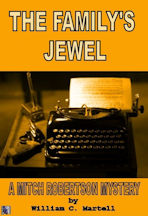
***
MITCH ROBERTSON #2: THE FAMILY'S JEWEL *** - For Kindle!
"The Presidential Suite of the Hollywood Hoover Hotel looked like a bloody battlefield: bodies everywhere, furniture broken, red liquid dripping from the walls, dead soldiers littering the elegant Berber rug as clouds of smoke overhead bounced between two air conditioning vents.
Mitch Robertson stepped over the body of an ex-child star turned sex tape star turned pop star and entered the room, spotted a gun on the floor and picked it up... careful not to spill his coffee with three pumps of mocha syrup from Penny’s Coffee Shop. That coffee was gold, the only thing keeping him going in this dazed state of wakefulness. The gun felt light. Holding it, he saw the silhouette of an 80s action star sitting sideways on a tipped over chair. Motionless. Was he dead? Mitch was still hung over from the Awards Party the night before, and wondered whether this was all some sort of crazy nightmare that he would wake up from... but when he tripped over the brown legs of a bottomless Superhero, flaccid junk encased in a condom but still wearing his mask, and hit the edge of the sofa, gun skittering and coffee spilling, he realized that it was all very real. What the hell had happened here?"
Short Novel. Only 99 cents - and no postage!
IT'S NEW!!
All About Rewrites!
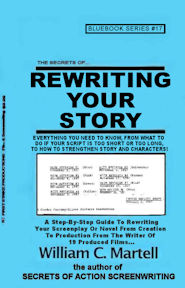
REWRITES Blue Book!
Rewriting In Waves?
When You Finish Your Screenplay Or Novel...
The Rewrites Begin!
The end is just the beginning! You’ve finished your story, but now the rewriting begins! This 405 page book shows you how to rewrite your screenplay or novel to perfection. Everything from Character Consistency to Shoeboxing to How To Give And Receive Notes to 15 Solutions If Your Script’s Too Long! and 15 Solutions If Your Script’s Too Short! to Finding The Cause Of A Story Problem to Good Notes Vs. Bad Notes to Finding Beta Readers to Avoiding Predictability to Learning To Be Objective About Your Work to Script Killer Notes and Notes From Idiots to Production Rewrites and What The Page Colors Mean? and a Complete Rewrite Checklist! The complete book on Rewriting Your Story!
Only: $4.99
HITCHCOCK FOR WRITERS!
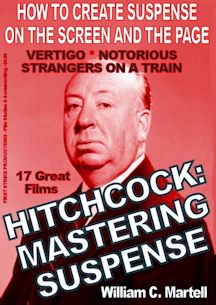
LEARN SUSPENSE FROM THE MASTER!
*** HITCHCOCK: MASTERING SUSPENSE *** - For Kindle!
Alfred Hitchcock, who directed 52 movies, was known as the *Master Of Suspense*; but what exactly is suspense and how can *we* master it? How does suspense work? How can *we* create “Hitchcockian” suspense scenes in our screenplays, novels, stories and films?
This book uses seventeen of Hitchcock’s films to show the difference between suspense and surprise, how to use “focus objects” to create suspense, the 20 iconic suspense scenes and situations, how plot twists work, using secrets for suspense, how to use Dread (the cousin of suspense) in horror stories, and dozens of other amazing storytelling lessons. From classics like “Strangers On A Train” and “The Birds” and “Vertigo” and “To Catch A Thief” to older films from the British period like “The 39 Steps” and “The Man Who Knew Too Much” to his hits from the silent era like “The Lodger” (about Jack The Ripper), we’ll look at all of the techniques to create suspense!
Only $5.99
NO KINDLE REQUIRED! Get the *free* app (any device, except your Mr. Coffee) on the order page on Amazon!
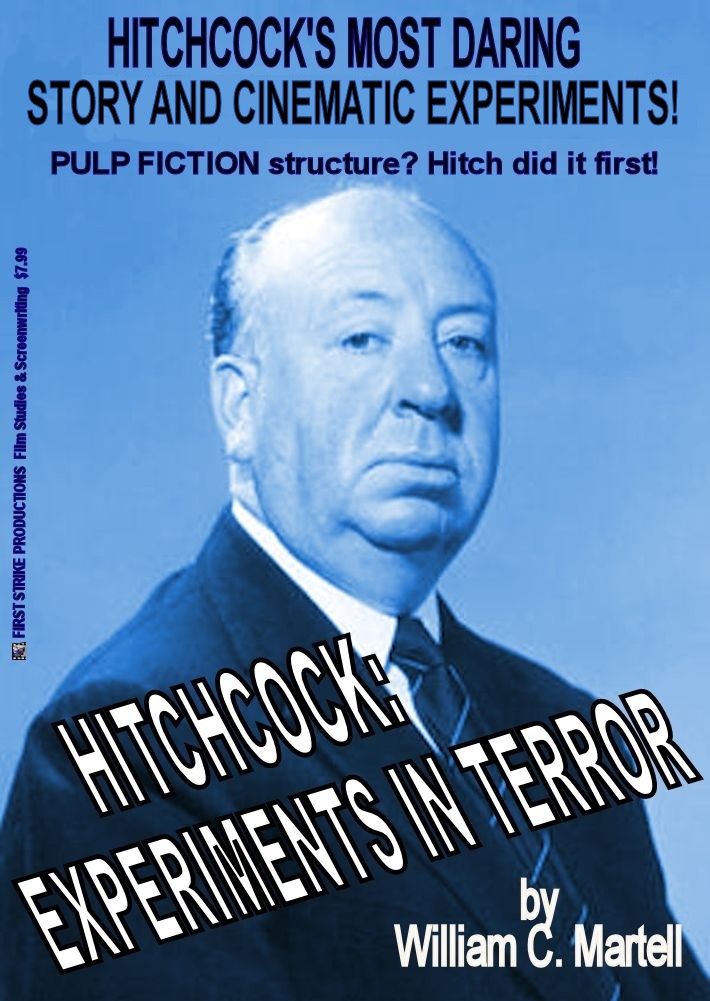
Strange Structures!
*** HITCHCOCK: EXPERIMENTS IN TERROR! *** - For Kindle!
***
Contained Thrillers like "Buried"? Serial Protagonists like "Place Beyond The Pines"? Multiple Connecting Stories like "Pulp Fiction"? Same Story Multiple Times like "Run, Lola, Run"?
HITCHCOCK DID IT FIRST!
This book focuses on 18 of Hitchcock's 52 films with wild cinema and story experiments which paved the way for modern films. Almost one hundred different experiments that you may think are recent cinema or story inventions... but some date back to Hitchcock's *silent* films! We'll examine these experiments and how they work. Great for film makers, screenwriters, film fans, producers and directors.
Only $5.99 - and no postage!
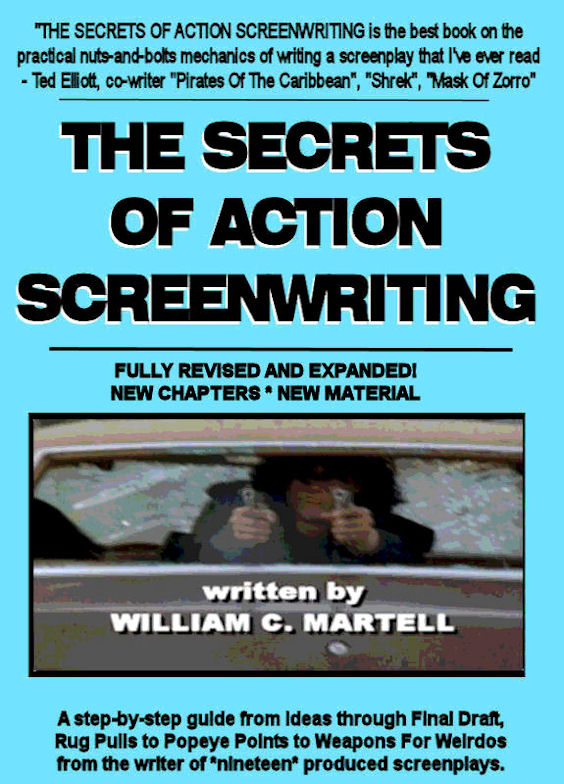
MAKES A GREAT GIFT!
*** THE SECRETS OF ACTION SCREENWRITING *** - For Kindle!
*** THE SECRETS OF ACTION SCREENWRITING *** - For Nook!
Why pay $510 for a used version of the 240 page 2000 version that used to retail for $21.95? (check it out!) when
you can get the NEW EXPANDED VERSION - over 500 pages - for just $9.99? New chapters, New examples, New techniques!
"SECRETS OF ACTION SCREENWRITING is the
best book on the practical nuts-and-bolts mechanics of writing a screenplay I've ever read."
- Ted Elliott, co-writer of MASK OF ZORRO, SHREK, PIRATES OF THE CARIBBEAN and the sequels (with Terry Rossio). (ie; 4 of the top 20 Box Office Hits Of ALL TIME.)
Only $9.99 - and no postage!
Tip FAQ

My New Script Secrets Newsletter!

STORY IN ACTION SERIES!

THE MISSION IMPOSSIBLE MOVIES
NEW: Updates On Films 7 & 8 Casting!
All Six Movies analyzed! All of the mission tapes, all of the “that’s impossible!” set pieces and stunts, the cons and capers - and how these scenes work, the twists and double crosses, the tension and suspense (and how to generate it), the concept of each film as a stand alone with a different director calling the shots (broken in the sixth film), the gadgets, the masks, the stories, the co-stars and team members (one team member has been in every film), the stunts Tom Cruise actually did (and the ones he didn’t), and so much more! Over 120,000 words of fun info!
THE MISSION IMPOSSIBLE MOVIES - 347 Pages - Only $3.99 !

BRAND NEW!
*** THE BOURNE MOVIES
NEW: Updates on TREADSTONE TV show!
All five "Bourne" movies (including "Legacy" and it's potential sequels) - what are the techniques used to keep the characters and scenes exciting and involving? Reinventing the thriller genre...
or following the "formula"? Five films - each with an interesting experiment! A detailed analysis of each
of the films, the way these thrillers work... as well as a complete list of box office and critical
statistics for each film. This book is great for writers, directors, and just fans of the series.
Only $3.99 - and no postage!
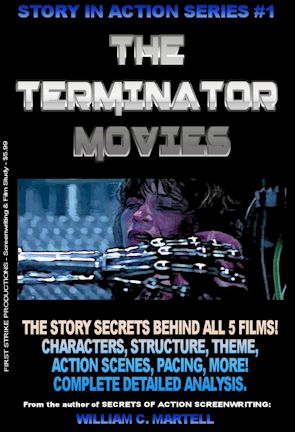
Over 240 pages!
*** THE TERMINATOR MOVIES *** - For Kindle!
He's back! The release of "Terminator: Dark Fate" is set to begin a new trilogy in
the Terminator story... 35 years after the first film was released. What draws us to these films about
a cybernetic organism from the future sent back in time? Why is there a new proposed trilogy every few
years? This book looks at all five Terminator movies from a story standpoint - what makes them work
(or not)? What are the techniques used to keep the characters and scenes exciting and involving? How
about those secret story details you may not have noticed? Containing a detailed analysis of each of
the five films so far, this book delves into the way these stories work... as well as a complete list of
box office and critical statistics for each film. This book is great for writers, directors, and just
fans of the series.
ONLY $3.99 - and no postage!
NO KINDLE REQUIRED! Get the *free* app (any device, except your Mr. Coffee) on the order page on Amazon!

NEW BUT OLD!
*** VINTAGE #1: HOW TO WRITE PHOTOPLAYS *** - For Kindle!
***
Screenwriting books have been around as long as films have. This series reprints vintage screenwriting books with a new introduction and history, plus new articles which look at how these lessons from almost 100 years ago apply to today’s screenplays. Anita Loos book is filled with information which still applies.
In addition to the full text of the original book, you get the full screenplay to Miss Loos' hit THE LOVE EXPERT, plus several new articles on the time period and women in Hollywood.
Only $2.99 - and no postage!
THE BLUE BOOKS!
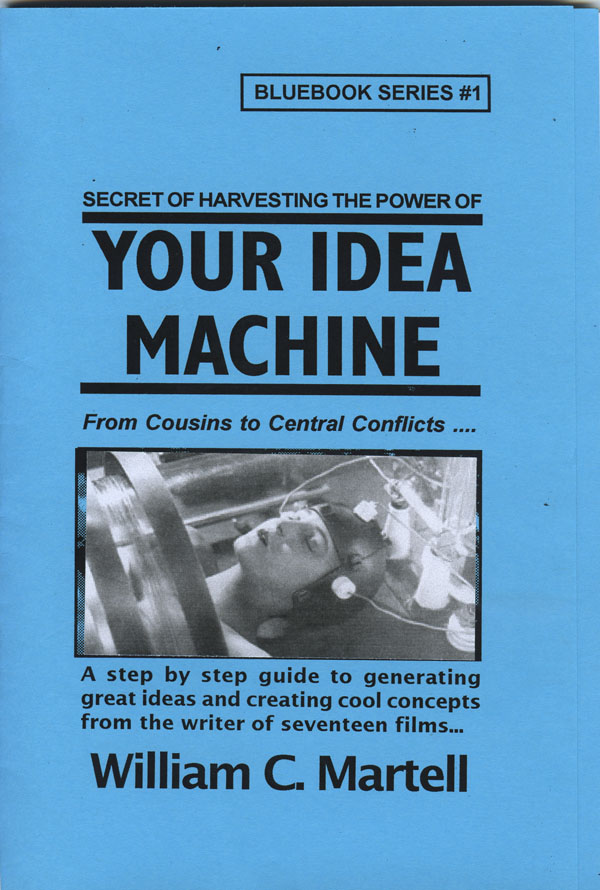
FIND A GREAT IDEA!
*** YOUR IDEA MACHINE *** - For Kindle!
****
Expanded version with more ways to find great ideas! Your screenplay is going to begin with an idea. There are good ideas and bad ideas and commercial ideas and personal ideas. But where do you find ideas in the first place? This handbook explores different methods for finding or generating ideas, and combining those ideas into concepts that sell. The Idea Bank, Fifteen Places To Find Ideas, Good Ideas And Bad Ideas, Ideas From Locations And Elements, Keeping Track Of Your Ideas, Idea Theft - What Can You Do? Weird Ways To Connect Ideas, Combing Ideas To Create Concepts, High Concepts - What Are They? Creating The Killer Concept, Substitution - Lion Tamers & Hitmen, Creating Blockbuster Concepts, Magnification And The Matrix, Conflict Within Concept, Concepts With Visual Conflict, Avoiding Episodic Concepts, much more! Print version is 48 pages, Kindle version is over 175 pages!
Only $4.99 - and no postage!
FIGURE OUT YOUR STORY!
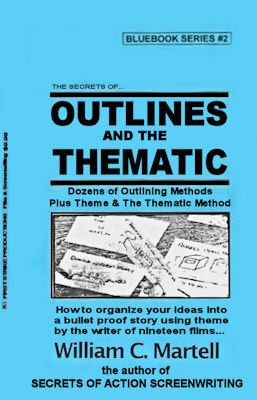
OUTLINES & THE THEMATIC Blue Book.
ARE YOUR SCENES IN THE RIGHT ORDER?
AND ARE THEY THE RIGHT SCENES?
Your story is like a road trip... but where are you going? What's the best route to get there? What are the best sights to see along the way? Just as you plan a vacation instead of just jump in the car and start driving, it's a good idea to plan your story. An artist does sketches before breaking out the oils, so why shouldn't a writer do the same? This Blue Book looks at various outlining methods used by professional screenwriters like Wesley Strick, Paul Schrader, John August, and others... as well as a guest chapter on novel outlines. Plus a whole section on the Thematic Method of generating scenes and characters and other elements that will be part of your outline. The three stages of writing are: Pre-writing, Writing, and Rewriting... this book looks at that first stage and how to use it to improve your screenplays and novels.
Only $4.99 - and no postage!
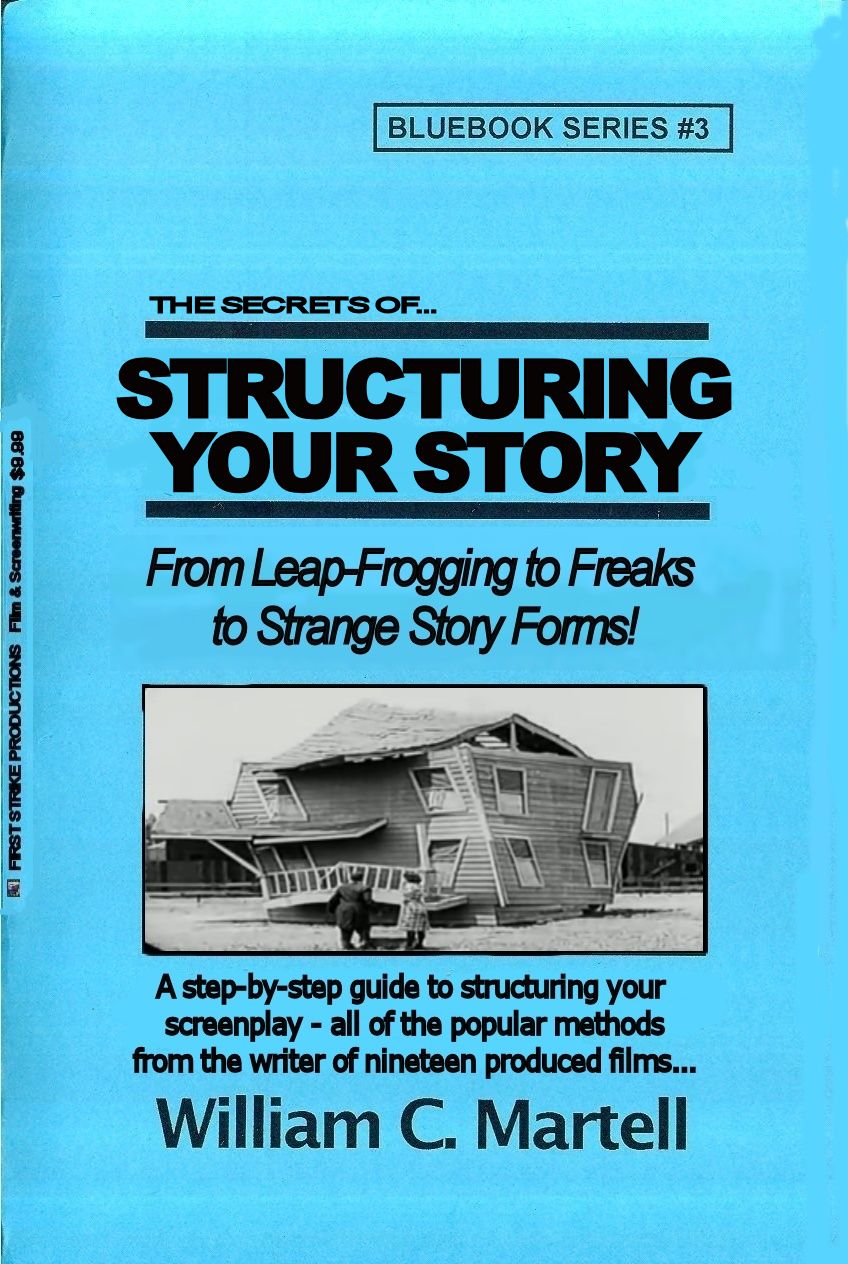
GOT STRUCTURE?!
*** STRUCTURING YOUR STORY *** - For Kindle!
William Goldman says the most important single element of any screenplay is structure. It’s the skeleton under the flesh and blood of your story. Without it, you have a spineless, formless, mess... a slug! How do you make sure your structure is strong enough to support your story? How do you prevent your story from becoming a slug? This Blue Book explores different types of popular structures from the basic three act structure to more obscure methods like leap-frogging. We also look at structure as a verb as well as a noun, and techniques for structuring your story for maximum emotional impact. Most of the other books just look at *structure* and ignore the art of *structuring* your story. Techniques to make your story a page turner... instead of a slug!
Only $4.99 - and no postage!

STORY: WELL TOLD!
*** STORY: WELL TOLD *** - For Kindle!
This book takes you step-by-step through the construction of a story... and how to tell a story well, why Story always starts with character... but ISN'T character, Breaking Your Story, Irony, Planting Information, Evolving Story, Leaving No Dramatic Stone Unturned, The Three Greek Unities, The Importance Of Stakes, The Thematic Method, and how to create personal stories with blockbuster potential. Ready to tell a story?
Print version was 48 pages, Kindle version is over 85,000 words - 251 pages!
Only $4.99 - and no postage!

START STRONG!
*** HOOK 'EM IN TEN *** - For Kindle!
Your story doesn't get a second chance to make a great first impression, and this book shows you a
bunch of techniques on how to do that. From the 12 Basic Ways To Begin Your Story, to the 3 Stars Of
Your First Scene (at least one must be present) to World Building, Title Crawls, Backstory, Starting
Late, Teasers and Pre Title Sequences, Establishing Theme & Motifs (using GODFATHER PART 2), Five Critical
Elements, Setting Up The Rest Of The Story (with GODFATHER), and much more! With hundreds of examples
ranging from Oscar winners to classic films like CASABLANCA to some of my produced films (because
I know exactly why I wrote the scripts that way). Biggest Blue Book yet!
Print version was 48 pages, Kindle version is over 100,000 words - 312 pages!
Only $4.99 - and no postage!
NO KINDLE REQUIRED! Get the *free* app (any device, except your Mr. Coffee) on the order page on Amazon!
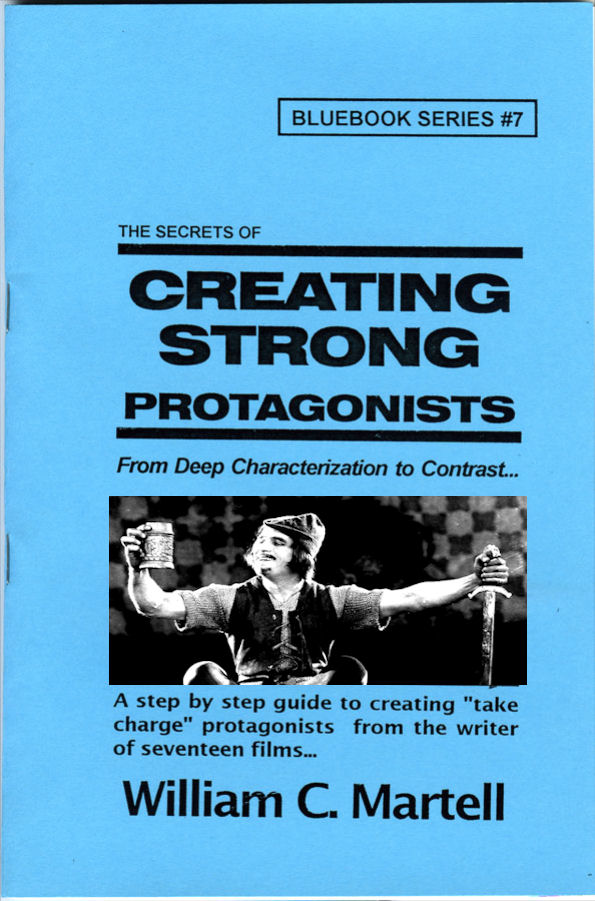
MOVIES ARE CHARACTERS!
*** CREATING STRONG PROTAGONISTS *** - For Kindle!
*** CREATING STRONG PROTAGONISTS *** - For Nook!
Expanded version with more ways to create interesting protagonists! A step-by-step guide to creating "take charge" protagonists. Screenplays are about characters in conflict... characters in emotional turmoil... Strong three dimensional protagonists who can find solutions to their problems in 110 pages. But how do you create characters like this? How do you turn words into flesh and blood? Character issues, Knowing Who Is The Boss, Tapping into YOUR fears, The Naked Character, Pulp Friction, Man With A Plan, Character Arcs, Avoiding Cliche People, Deep Characterization, Problem Protagonists, 12 Ways To Create Likable Protagonists (even if they are criminals), Active vs. Reactive, The Third Dimension In Character, Relationships, Ensemble Scripts, and much, much more. Print version is 48 pages, Kindle version is once again around 205 pages!
ONLY $4.99 - and no postage!
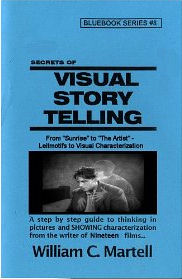
I WRITE PICTURES!
*** VISUAL STORYTELLING *** - For Kindle! (exclusive)
Show Don't Tell - but *how* do you do that? Here are techniques to tell stories visually! Using Oscar Winning Films and Oscar Nominated Films as our primary examples: from the first Best Picture Winner "Sunrise" (1927) to the Oscar Nominated "The Artist" (which takes place in 1927) with stops along the way Pixar's "Up" and Best Original Screenplay Winner "Breaking Away" (a small indie style drama - told visually) as well as "Witness" and other Oscar Winners as examples... plus RISE OF THE PLANET OF THE APES. Print version is 48 pages, Kindle version is over 200 pages!
ONLY $4.99 - and no postage!
DESCRIPTION & VOICE Blue Book!
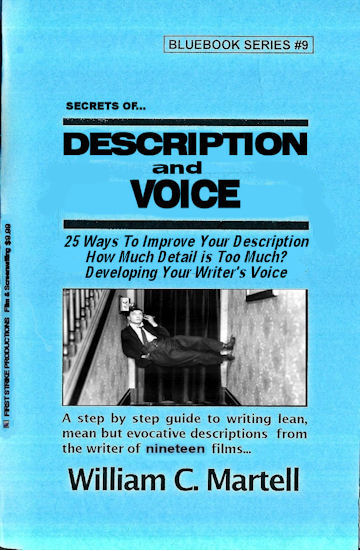
DESCRIPTION & VOICE Blue Book.
IS HALF OF YOUR STORY IN TROUBLE?
Most screenplays are about a 50/50 split between dialogue and description - which means your description is just as important as your dialogue. It just gets less press because the audience never sees it, the same reason why screenwriters get less press than movie stars. But your story will never get to the audience until readers and development executives read your script... so it is a very important factor. Until the movie is made the screenplay is the movie and must be just as exciting as the movie. So how do you make your screenplay exciting to read? Description is important in a novel as well, and the “audience” does read it... how do we write riveting description?
Only $4.99 and no postage!

PRO DIALOGUE TECHNIQUES!
*** DIALOGUE SECRETS *** - For Kindle!
***
Expanded version with more ways to create interesting dialogue! How to remove bad dialogue (and what *is* bad dialogue), First Hand Dialogue, Awful Exposition, Realism, 50 Professional Dialogue Techniques you can use *today*, Subtext, Subtitles, Humor, Sizzling Banter, *Anti-Dialogue*, Speeches, and more. Tools you can use to make your dialogue sizzle! Special sections that use dialogue examples from movies as diverse as "Bringing Up Baby", "Psycho", "Double Indemnity", "Notorious", the Oscar nominated "You Can Count On Me", "His Girl Friday", and many more! Print version is 48 pages, Kindle version is over 175 pages!
Only $4.99 - and no postage!

WHAT IS A SCENE?
*** SCENE SECRETS *** - For Kindle!
***
What is a scene and how many you will need? The difference between scenes and sluglines. Put your scenes on trial for their lives! Using "Jaws" we'll look at beats within a scene. Scene DNA. Creating set pieces and high concept scenes. A famous director talks about creating memorable scenes. 12 ways to create new scenes. Creating unexpected scenes. Use dramatic tension to supercharge your scenes. Plants and payoffs in scenes. Plus transitions and buttons and the all important "flow"... and more! Over 65,000 words! Print version was 48 pages, Kindle version is around 210 pages!
Only $4.99 - and no postage!
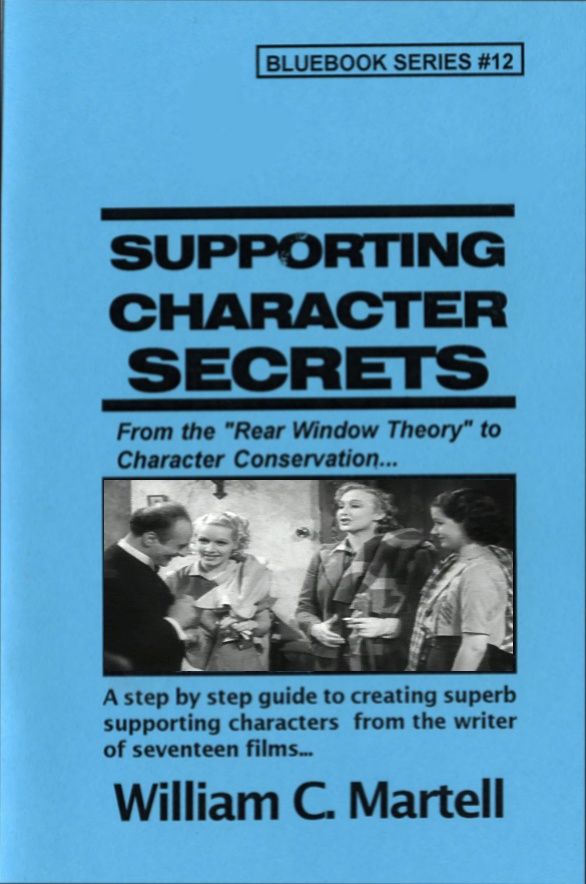
SUBPLOTS?
*** SUPPORTING CHARACTER SECRETS *** - For Kindle! (Exclusive)
Expanded version with more techniques to flesh out your Supporting Characters and make them individuals. Using the hit movie BRIDESMAIDS as well as other comedies like THE HANGOVER and TED and HIGH FIDELITY and
40 YEAR OLD VIRGIN and many other examples we look at ways to make your Supporting Characters come alive on the page.
Print version was 48 pages, Kindle version is around 170 pages!
ONLY $4.99 - and no postage!
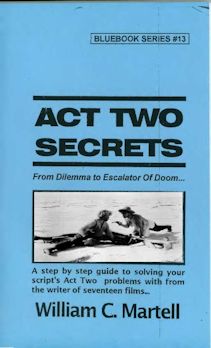
ACT TWO SOLUTIONS!
*** ACT TWO SECRETS *** - For Kindle!
Expanded version with more techniques to help you through the desert of Act Two! Subjects Include: What Is Act Two? Inside Moves, The 2 Ps: Purpose & Pacing, The 4Ds: Dilemma, Denial, Drama and Decision, Momentum, the Two Act Twos, Subplot Prisms, Deadlines, Drive, Levels Of Conflict, Escalation, When Act Two Begins and When Act Two Ends, Scene Order, Bite Sized Pieces, Common Act Two Issues, Plot Devices For Act Two, and dozens of others. Over 67,000 words (that’s well over 200 pages) of tools and techniques to get you through the desert of Act Two alive!
Print version was 48 pages, Kindle version is well over 200 pages!
ONLY $4.99 - and no postage!
All About Endings!
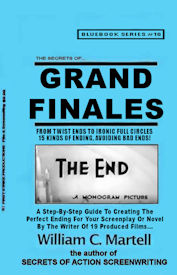
GRAND FINALES Blue Book!
The Perfect Ending For Your Story!
The First Ten Pages Of Your Screenplay Are Critical,
But What About The Last 10 Pages?
Creating the perfect ending to your story! This 100,000 word book shows you how to end your story with a bang, rather than a whimper. Everything from Resolution Order to Act Three Tools to Happy or Sad Endings? to How The Beginning Of Your Story Has Clues To The Ending (in case you were having trouble figuring out how the story should end) to Falling Action to How To Avoid Bad Endings to Writing The Perfect Twist Ending to Setting Up Sequels & Series to Emotional Resolutions to How To Write Post Credit Sequences to Avoiding Deus Ex Machinas, to 20 Different Types Of Ends (and how to write them) and much more! Everything about endings for your screenplay or novel!
Only: $4.99
NO KINDLE REQUIRED! Get the *free* app (any device, except your Mr. Coffee) on the order page on Amazon!
All About LOGLINES, TREATMENTS, and PITCHING!
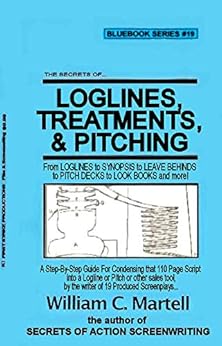
LOGLINES, TREATMENTS, and PITCHING! Blue Book!
Distilling Your Screenplay!
Loglines, Treatments, Pitching, Look Books, Pitch Decks, One Pagers, Rip-O-Matics?
You have written a brilliant 110 page screenplay, but how do you get anyone to read it? You need to distill it down into some form of verbal moonshine or story rocket fuel that will ignite that bored development executive or manager or agent and get them to request your screenplay. But how do you shrink those 110 pages into a 25 word logline or a 2 minute elevator pitch or a one page synopsis or a short paragraph? This 100,000 word book shows you how! Everything you need to know! From common logline mistakes (and how to solve them) to how your pitch can reveal story problems to the 4 types of pitches!
272 Pages - ONLY $4.99!
READY TO BREAK IN?
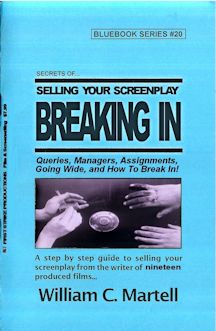
THE BUISINESS SIDE
*** BREAKING IN BLUE BOOK *** - For Kindle!
Should really be called the BUSINESS BLUE BOOK because it covers almost everything you will need to
know for your screenwriting career: from thinking like a producer and learning to speak their language,
to query letters and finding a manager or agent, to making connections (at home and in Hollywood) and
networking, to the different kinds of meetings you are will have at Studios, to the difference between
a producer and a studio, to landing an assignment at that meeting and what is required of you when you
are working under contract, to contracts and options and lawyers and... when to run from a deal!
Information you can use *now* to move your career forward! It's all here in the Biggest Blue Book yet!
Print version was 48 pages, Kindle version is over 400 pages!
$4.99 - and no postage!

Use your creative energy to focus on the content; let Final Draft take care of the style. Final Draft is the number-one selling application specifically designed for writing movie scripts, television episodics and stage plays. Its ease-of-use and time-saving features have attracted writers for almost two decades positioning Final Draft as the Professional Screenwriters Choice. Final Draft power users include Academy, Emmy and BAFTA award winning writers like Oliver Stone, Tom Hanks, Alan Ball, J.J. Abrams, James Cameron and more.
* * * Buy It!

|

